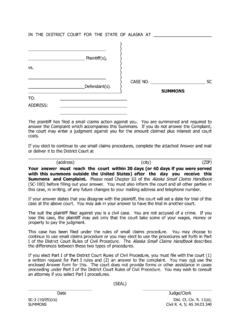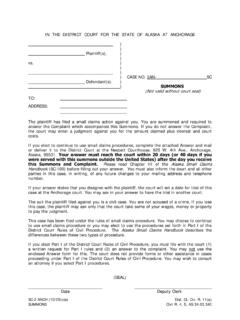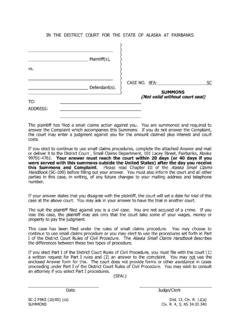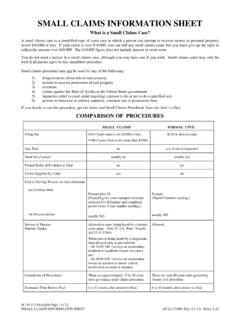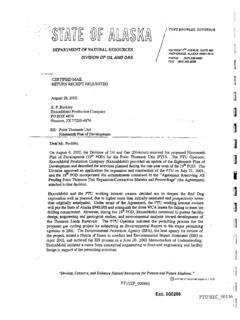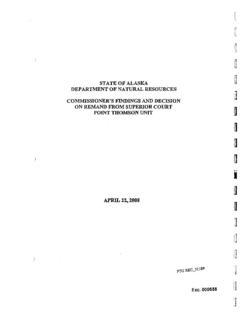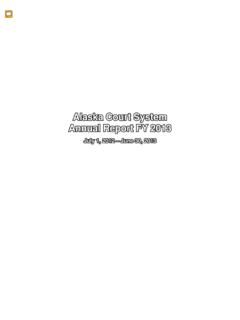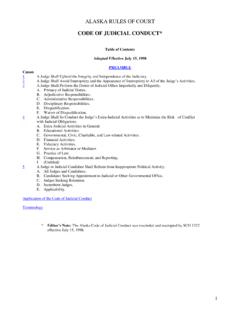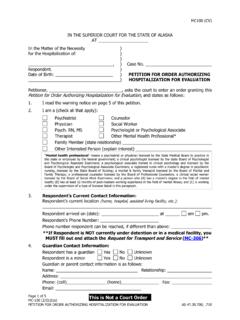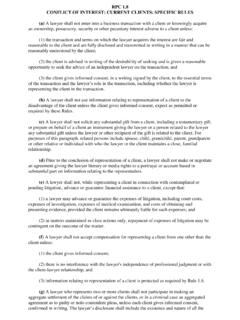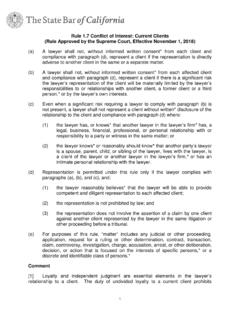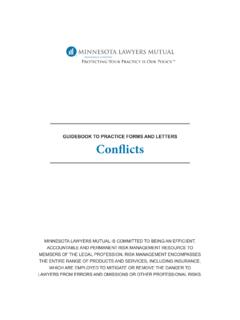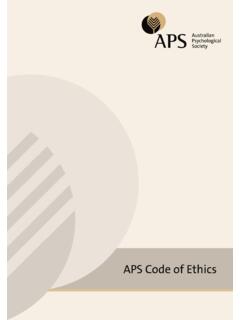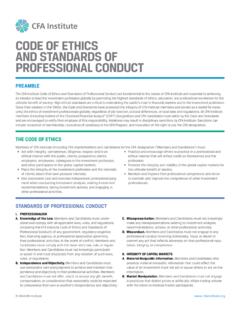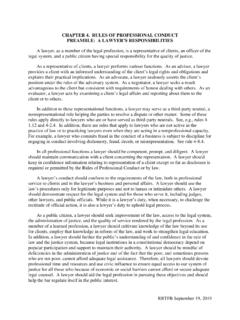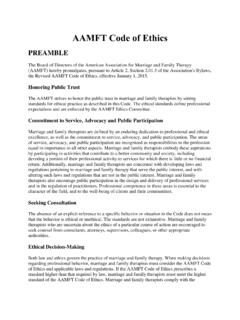Transcription of ALASKA RULES OF PROFESSIONAL CONDUCT
1 ALASKA RULES OF COURT ALASKA RULES OF PROFESSIONAL CONDUCT Table of Contents PREAMBLE: A LAWYER S RESPONSIBILITIES SCOPE CLIENT-LAWYER RELATIONSHIP Rule Competence. Scope of Representation and Allocation of Authority Between Client and Lawyer. Diligence. Communication: Case Status; Informed Consent; Malpractice Insurance Disclosure. Fees. Confidentiality of Information. conflict of interest : current clients . conflict of interest : current Specific RULES . conflict of interest : Duties to Former clients . Imputation of conflicts of interest : General Rule. Special conflicts of interest for Former and current Government Officers and Employees. Former Judge, Arbitrator, Mediator, or Other Third-Party Neutral. Organization as Client. Client With Impaired Capacity. Safekeeping Property.
2 Declining or Terminating Representation. Sale of Law Practice. Duties to Prospective Client. COUNSELOR Advisor. [Deleted] Evaluation for Use by Third Persons. Lawyer Serving as Third-Party Neutral. ADVOCATE Meritorious Claims and Contentions. Expediting Litigation. Candor Toward the Tribunal. Fairness to Opposing Party and Counsel. Impartiality and Decorum of the Tribunal. Trial Publicity. Lawyer as Witness. Special Responsibilities of a Prosecutor. Advocate in Nonadjudicative Proceedings. TRANSACTIONS WITH PERSONS OTHER THAN clients Truthfulness in Statements to Others. Communication with Person Represented by Counsel. Dealing with Unrepresented Person. Respect for Rights of Third Persons LAW FIRMS AND ASSOCIATIONS Responsibilities of a Partners, Managers, and Supervisory Lawyers.
3 Responsibilities of a Subordinate Lawyer. Responsibilities Regarding Nonlawyer Assistance. PROFESSIONAL Independence of a Lawyer. ALASKA COURT RULES 2 Unauthorized Practice of Law; Multijurisdictional Practice of Law. Restriction on Right to Practice. Responsibilities Regarding Law-Related Services. PUBLIC SERVICE Voluntary Pro Bono Public Service. Accepting Appointments. Membership in Legal Services Organization. Law Reform Activities Affecting Client Interests. Nonprofit and Court-Annexed Limited Legal Services Programs. INFORMATION ABOUT LEGAL SERVICES Communications Concerning a Lawyer s Services. Advertising. Solicitation of clients . Communication of Fields of Practice and Specialization. Firm Names and Letterheads. MAINTAINING THE INTEGRITY OF THE PROFESSION Bar Admission and Disciplinary Matters.
4 Judicial and Legal Officials. Reporting PROFESSIONAL Misconduct. Misconduct. Disciplinary Authority; Choice of Law. Definitions. PROFESSIONAL CONDUCT 3 PREAMBLE: A LAWYER S RESPONSIBILITIES A lawyer, as a member of the legal profession, is a representative of clients , an officer of the legal system, and a public citizen having special responsibility for the quality of justice. As a representative of clients , a lawyer performs various functions. As advisor, a lawyer provides a client with an informed understanding of the client s legal rights and obligations and explains their practical implications. As advocate, a lawyer zealously asserts the client s position under the RULES of the adversary system. As negotiator, a lawyer seeks a result advantageous to the client but consistent with requirements of honest dealings with others.
5 As an evaluator, a lawyer acts by examining a client s legal affairs and reporting about them to the client or to others. In addition to these representational functions, a lawyer may serve as a third-party neutral, a nonrepresentational role helping the parties to resolve a dispute or other matter. Some of these RULES apply directly to lawyers who are or have served as third-party neutrals. See, , RULES and In addition, there are RULES that apply to lawyers who are not active in the practice of law or to practicing lawyers even when they are acting in a nonprofessional capacity. For example, a lawyer who commits fraud in the CONDUCT of a business is subject to discipline for engaging in CONDUCT involving dishonesty, fraud, deceit, or misrepresentation.
6 See Rule In all PROFESSIONAL functions a lawyer should be competent, prompt, and diligent. A lawyer should maintain communication with a client concerning the representation. A lawyer should keep the confidences and secrets of a client except so far as disclosure is required or permitted by the RULES of PROFESSIONAL CONDUCT or other law. A lawyer s CONDUCT should conform to the requirements of the law, both in PROFESSIONAL service to clients and in the lawyer s business and personal affairs. A lawyer should use the law s procedures only for legitimate purposes and not to harass or intimidate others. A lawyer should demonstrate respect for the legal system and for those who serve it, including judges, other lawyers and public officials.
7 While it is a lawyer s duty, when necessary, to challenge the rectitude of official action, it is also a lawyer s duty to uphold legal process. As a public citizen, a lawyer should seek improvement of the law, access to the legal system, the administration of justice, and the quality of service rendered by the legal profession. As a member of a learned profession, a lawyer should cultivate knowledge of the law beyond its use for clients , employ that knowledge in reform of the law, and work to strengthen legal education. In addition, a lawyer should further the public s understanding of and confidence in the rule of law and the justice system because legal institutions in a constitutional democracy depend on popular participation and support to maintain their authority.
8 A lawyer should be mindful of deficiencies in the administration of justice and of the fact that the poor, and sometimes persons who are not poor, cannot afford adequate legal assistance. Therefore, all lawyers should devote PROFESSIONAL time and resources and use civic influence to ensure equal access to our system of justice for all those who because of economic or social barriers cannot afford or secure adequate legal counsel. A lawyer should aid the legal profession in pursuing these objectives and should help the bar regulate itself in the public interest . Many of a lawyer s PROFESSIONAL responsibilities are prescribed in the RULES of PROFESSIONAL CONDUCT , as well as substantive and procedural law. However, a lawyer is also guided by personal conscience and the approbation of PROFESSIONAL peers.
9 A lawyer should strive to attain the highest level of skill, to improve the law and the legal profession, and to exemplify the legal profession s ideals of public service. A lawyer s responsibilities as a representative of clients , an officer of the legal system and a public citizen are usually harmonious. Thus, when an opposing party is well represented, a lawyer can be a zealous advocate on behalf of a client and at the same time assume that justice is being done. So also, a lawyer can be sure that preserving client confidences and secrets ordinarily serves the public interest because people are more likely to seek legal advice, and thereby heed their legal obligations, when they know their communications will be private. In the nature of law practice, however, conflicting responsibilities are encountered.
10 Virtually all difficult ethical problems arise from conflict between a lawyer s responsibili-ties to clients , to the legal system, and to the lawyer s own interest in remaining an ethical person while earning a satisfactory living. The RULES of PROFESSIONAL CONDUCT often prescribe terms for resolving such conflicts . Within the framework of these RULES , however, many difficult issues of PROFESSIONAL discretion can arise. Such issues must be resolved through the exercise of sensitive PROFESSIONAL and moral judgment guided by the basic principles underlying the RULES . These principles include the lawyer s obligation zealously to protect and pursue a client s legitimate interests, within the bounds of the law, while maintaining a PROFESSIONAL , courteous, and civil attitude toward all persons involved in the legal system.
